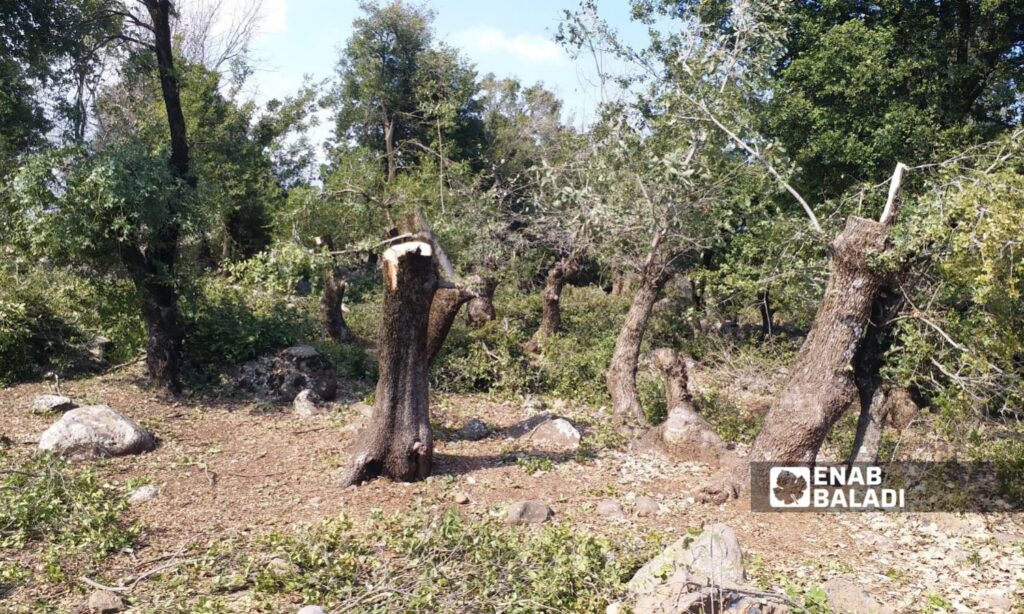Quneitra – Zain al-Joulani
The Jubata al-Khashab and Trinjeh nature reserve has preserved its plant wealth as one of the most important tourism landmarks in Quneitra governorate, despite the widespread illicit woodcutting that has spread across Syria in recent years, due to its distance from urban areas. However, woodcutting has recently reached it, prompting young men from the province to guard it.
The forest contains various types of trees, such as oaks, hawthorns, wild plum trees, and calicotome, as well as types of birds and animals.
Throughout the years following 2011, the residents of Quneitra governorate, through individual efforts, managed to protect the natural reserve throughout the war imposed on them by the Syrian regime.
After the regime took control in mid-2018, it resumed operations at the forestry station belonging to the Quneitra Agriculture Directorate, leading to worsening conditions, according to local residents speaking to Enab Baladi.
Due to rising fuel prices and the lack of alternatives to wood for heating, and the failure of official agencies and Quneitra governorate to provide heating solutions in the winter, some residents in the northern countryside of the province, known for its cold winter climate, sought out areas rich in trees to gather firewood.
A local initiative
To protect the reserve, a local committee for forestry protection was formed in coordination with forestry staff and the Quneitra Agriculture Directorate.
Samer Zaghloul, the committee head, told Enab Baladi that he is working with 20 young men from Trinjeh and Jubata al-Khashab to protect the natural reserve and prevent logging within it.
He added that overgrazing had been detrimental to the reserve, but this was also banned, along with the organization of patrols day and night to combat woodcutting within the area.
The committee prohibits entry to the forest at night under any circumstances, even if entering is not harmful to the reserve. The purpose of night patrols in the area is to ensure it is free from any visitors.
Members of the local committee receive nominal salaries, with the help of expatriate residents who believe it is necessary to protect the natural wealth in the area, according to the committee president.
For his part, Ali Ahmad, a member of the committee, said the forest was the town’s stronghold during the past years; during the war from 2013 to 2015, the regime and the militias fighting alongside it tried to invade the town under heavy artillery shelling. However, the density of the trees and the attackers’ unfamiliarity with the routes inside the forest helped the region’s fighters repel the assaults, although it ultimately ended with a settlement agreement that resulted in the regime’s control over southern Syria.
Strict measures
Ghanem, a 55-year-old man who works in a government agency in Quneitra, told Enab Baladi that he used to go daily to collect dry wood lying on the ground to ensure heating for his family in winter, without cutting any trees. However, he complained of being prevented from entering the forest to gather wood as winter approached.
He added that the local committee responsible for protecting the forest has not allowed anyone to take a single piece of wood from the Jubata al-Khashab reserve, known to the residents of the province as “the forest.”
Ahmad Bakr, from the town of Trinjeh in the Quneitra countryside, owns 100 heads of mountain goats and also suffers from restrictions imposed on the natural reserve, as his herd is banned from entering the reserve, according to what he told Enab Baladi.
He added that the committee prohibits livestock breeders from approaching the reserve to protect the natural wealth within it.
Jubata al-Khashab nature reserve
Covering an area of 133 hectares, more than 30,000 trees of oaks, hawthorns, wild plum trees, and calicotome coexist, along with squirrels, rabbits, foxes, and deer, as well as birds such as hawks, owls, blackbirds and shrikes.
The reserve borders the village of Jubata al-Khashab to the west and south, the village of Ofania to the east, and the Trinjeh forest to the north, and it contains approximately 100 types of plants such as sumac, wild mint, capers, and chamomile, which grow on its red basaltic soil.
According to data from the Ministry of Agriculture and Agrarian Reform, the total area of registered forests and reserves in Quneitra in 2018 is 3,401 hectares.
The area of industrial afforestation is 2,026 hectares distributed over about 30 forest sites, while the area of natural forests is 655 hectares, which includes the Breqa and Bir Ajm reserves “that were completely uprooted during the war,” as reported by the Syrian Arab News Agency (SANA).
The Quneitra Directorate of Agriculture and Agrarian Reform estimated in December 2018 that the damage to natural forests and forested areas during the war amounted to 552 million Syrian pounds (1.1 million dollars).
According to statements from the directorate’s officials to SANA, the afforestation plan in the province includes the rehabilitation of 130 hectares of natural and artificial forest sites.











